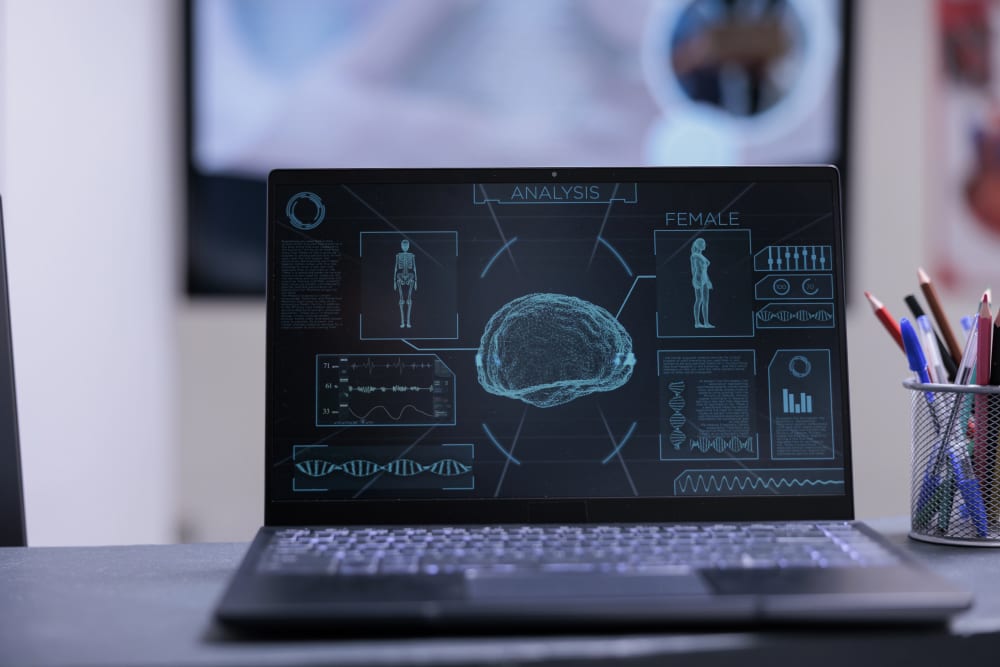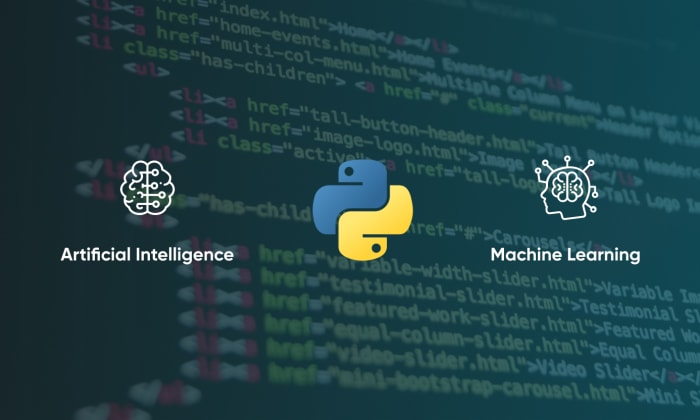AI in Healthcare: A Revolution for the Medical Industry


Artificial intelligence (AI) is used in many fields because it can significantly improve our lives. In short, it can substantially impact how we interact, purchase goods, and process information. AI, in healthcare and other fields, can complete the same tasks as human users, and, in many cases, more efficiently and in less time.
AI focuses on complex algorithms and software that can deal with many tasks: speech and text recognition, data analysis, learning, and decision-making, among other actions.
Because of this, AI has a broad scope of application, and there is no doubt that the healthcare industry benefits from it already. Healthcare and artificial intelligence can be combined so that hospitals, physicians, and patients – everyone – will be able to enjoy the advantages of AI.
Let’s take a detailed look at the different types of AI in healthcare, their benefits, challenges, and use cases.
What is AI in healthcare?
It’s important to understand that artificial intelligence is not one technology. Instead, it is a common term for an entire sector of computer science.
This burgeoning sector of computer science allows stakeholders in the healthcare industry to store, analyse, and process large sets of patient information. AI also helps doctors make more accurate diagnoses and improve treatment plans with accurate predictions.
In addition, artificial intelligence in healthcare can be used for the manufacturing of drugs, monitoring of patients, and delivery of care. As a result, AI can elevate the entire healthcare sector, with the future goal of preventing disease rather than curing its symptoms.
X-ray, MRI, and CT images contain a lot of complex data that can be difficult to evaluate, even by the best physicians and specialists. Specialists use this type of imagery to diagnose diseases accurately, but this approach isn’t perfect by any stretch.
Moreover, it’s also necessary to consider multiple types and subtypes of diseases, biomarkers, and genomics data, all of which may potentially complicate the care delivery process.
This is the point where healthcare and AI start cooperating. Through AI-based models, specialists can detect essential issues that are not always visible to the human eye during diagnostics.
In addition, AI-based devices can scan images for every tiny detail, ensuring an accurate analysis.
Of course, this is only one example of AI in healthcare.
In the following section, we’ll explore the types of AI and their relevance to healthcare.
Types of artificial intelligence in healthcare
As we mentioned, AI is a broad concept that includes a collection of technologies. As we discuss healthcare, we’ll highlight some of the ways AI can be used in this field.
Machine learning
Machine learning is a statistical technique that trains artificial intelligence to function independently and helps expand its knowledge. The goal is for the ML-powered device or platform to perform assigned functions more accurately and efficiently.
AI and machine learning in healthcare are primarily used in precision medicine. In many of these cases, ML algorithms help create a treatment plan based on a patient’s disease history.
Neural networks
A more complex form of machine learning is the neural network. This is a mathematical model that imitates the function of a live organism’s nerve cell networks. Neural networks can be used in the healthcare industry for computer vision, data analysis, and object recognition.
Deep learning
Finally, the most complex form of machine learning is deep learning. For example, when we mentioned applications of AI in healthcare above, deep learning is the relevant technology used to analyse scans and images where many different features are hidden inside. So, deep learning includes the most thorough and detailed analysis of input data.
We will cover more details about AI and ML in healthcare in the use cases section later in this article.
Natural language processing (NLP)
NLP is a type of technology that everyone, whether they know it or not, has seen many times. When you speak with a voice assistant who listens to your voice commands and performs tasks you set, you are using NLP technology.
The device's ability to process speech, structure the information, understand it, and then answer the user is what natural language processing does.
NLP is based on machine learning. In healthcare, specialists may use NLP to create, understand and classify clinical documentation.
Furthermore, NLP systems can transcribe patient interactions, conduct conversational AI, and analyse clinical notes.
Robotic process automation (RPA)
First, we need to note that RPA doesn’t mean the involvement of physical robots. Instead, RPA implies the use of software on an AI basis.
Robotic process automation helps automate business processes and routine tasks that are necessary for healthcare facilities.
AI technology in healthcare can be used as RPA solutions, which help update patient records and billing. These also enable intelligent document processing, ensure permanent customer service, and many other tasks.
As you can see, AI and healthcare can work together efficiently. However, you will find detailed use cases below for a comprehensive picture.
Creating an AI-based healthcare app can become a complex task. Make sure that you entrust it to professionals. Contact Go Wombat.
Benefits of AI in healthcare

Before we go over how AI is used in healthcare, let’s discuss the benefits of medical AI software. This will help you see the value that AI-powered software development can bring to your facility.
Fast analysis
AI algorithms can analyse data much faster than humans do. Regardless of how complex and large data volumes may be, AI allows analysing of medical records, clinical studies, and genetic information quickly. Specialists can use the condensed information to make accurate diagnoses.
Automation
AI and automation in healthcare substantially improve the performance of healthcare facilities and help them handle routine, repetitive tasks.
Researchers can focus on actions that require human involvement, administrators can ensure that their facilities are properly equipped, and physicians can focus on patient care while everyday tasks are automated using artificial intelligence.
Advanced health monitoring
Wearables created for medical purposes allow patients to monitor their health. Installed AI-based software contributes to advanced tracking, providing patients with statistics and vital health information.
In turn, physicians can remotely monitor the condition of patients and take appropriate measures when necessary.
Patient-centric approach
Task automation and accurate diagnoses that come from AI can increase patient satisfaction and trust in your specialists’ treatments.
What’s more, AI-based technology can actually improve diagnosis and treatment results, saving lives and improving the quality of life for patients across the board.
Improved efficiency
The examination of data patterns by AI technologies makes it possible for healthcare organisations to use this information as well as other assets more efficiently.
As a result, they can address critical areas with a better action plan, improving operational workflows and financial operations simultaneously.
Data connection
AI benefits in healthcare also include the opportunity to connect disparate healthcare data.
Healthcare data is often provided in different formats, and it is fragmented. When properly built, machine learning solutions allow specialists to connect fragmented data and give a more precise picture that results in improved operations.
AI applications in healthcare

Now that we’ve covered the types and benefits of artificial intelligence in healthcare, you can see how versatile and multifaceted AI is.
Let’s look at some AI use cases in the healthcare field.
Drug manufacturing
The development of a drug or vaccine and its further clinical trials are expensive and time-consuming processes.
But AI can help reduce the time spent on medication-making by analysing existing medicines' molecular structures and providing new ones according to set parameters.
A traditional drug-making process may take 5 years, costing millions of dollars. In some instances, AI can accelerate the process and potentially save many lives.
New technologies give hope that we can start treating diseases like Alzheimer's disease, AIDS, multiple sclerosis, and inoperable forms of cancer.
Data analytics
Analysing different data types was always a challenging and long-term process, so specialists needed a way to accelerate it.
In this instance, AI solutions in healthcare also came to the rescue.
Artificial intelligence is used to analyse large data amounts extracted from electronic health records, lab results, and other sources. This creates an accurate picture of a patient’s condition while using predictive analytics to generate possible treatment plans.
Predictive analytics will change the approach to health and the way to identify patterns that impact our overall well-being. For example, we will soon see AI algorithms that perform complex data assessment, from EHR systems to air quality, drinking water viability, and sewage system analysis.
Robotic surgery
Many industries are using robotic equipment for different tasks. Cargo transport, assembly lines, demining, logistics planning, military activity — the list of robotics applications goes on and on.
Year after year, robots are becoming smarter, especially due to the AI-powered algorithms that have replaced human operators. The healthcare industry isn’t an exception, as AI-based robots already perform many vital tasks.
Surgery is one of them.
In robot-assisted surgeries, robots have an integrated camera and they use surgical tools to complete medical operations. In addition, surgeons also control the process by monitoring it via camera and intervening if necessary.
Also, 3D models of patient anatomy created with AI analyses help doctors be more accurate and avoid complications during surgery.
Virtual assistants
Chances are, you’ve used virtual assistants that turn on your favourite music, help you navigate the city, or find the information you’re looking for.
But medical AI virtual assistants can also monitor your health and call for help in an emergency.
Virtual assistants can interact with patients, providing them with essential information about their conditions, treatments, and medical schedules.
Assistants can answer questions and schedule appointments with doctors. Through this type of technology, patients have the ability to learn more about their symptoms and know what to do in order to contact the right type of physician.
Diagnosis-making process
When most people think about AI in the healthcare industry, they probably imagine this application specifically.
Also connected with data analytics, AI diagnostics allow for a thorough analysis of images and lab results.
For example, diagnosticians receive a medical image and analyse it using AI solutions. The artificial intelligence tool can identify the features that human specialists may potentially miss.
Furthermore, deep learning technology can compare images with previous analyses and find minute deviations or abnormalities, if there are any.
As a result, physicians can make a more accurate diagnosis and avoid incorrect conclusions.
A good example is IBM Watson's neural network software. It helps make an accurate diagnosis by processing millions of available medical cases and comparing them to identify the disease and optimal treatment plan for every patient.
Patient data processing
The world is suffering from a severe shortage of medical specialists, and the number of patients is growing every day.
Besides diagnostic and treatment processes, physicians have to deal with many tasks like issuing statements, filling out medical records, and so on.
A vast number of patient records and studies are stored in paper format. But the good news is that AI technologies make it possible to digitise, collect, process and store all this medical data.
Artificial intelligence can assist in administering medical institutions, organising documentation, and managing financial operations.
If AI tools are applied properly, doctors can save time in administrative work and dedicate it to complex cases, medical studies, and professional development, instead of spending precious time on paperwork.
Telemedicine
Remote consultations became extremely important during the COVID-19 pandemic and have remained a staple for medical facilities. There are many cases where patients don’t need in-person visits, especially if they live far from the hospital or practice.
Doctors can use telemedicine software to provide real-time recommendations, learn more about symptoms, and even see the patient's general condition, if the camera resolution allows.
In addition, telemedicine software includes AI algorithms to process patients' input data to understand what specialists they need. Thus, patients can contact the right doctor right away.
Do you want to integrate AI into your healthcare software? Let Go Wombat help you — contact us to learn more.
Challenges of AI in healthcare

Even the most incredible technology has setbacks. So, despite all the benefits, AI in the healthcare market still has potential disadvantages. Let’s review some of them.
Lack of standardisation
Currently, there is yet to be a unified standard for analysing and inputting datasets gathered through AI tools in healthcare.
In addition, different companies create AI software, so it becomes difficult to improve deep learning processes and compare results.
An alternative here is to create a modular solution that comes with accompanying documentation. This means that you’ll be able to grow and expand your software based on your facility’s changing needs.
Diagnostic errors
Although AI helps increase diagnosis accuracy and improve the treatment process, it still can make mistakes.
Therefore, AI cannot be treated as if it were 100% accurate. Under this assumption, your patients may be misdiagnosed, which can result in a flurry of additional problems. This means that your AI solutions must be built and tested correctly to avoid such incidents.
Privacy issues
All applications that collect and store personal data must comply with local regulations. For example, in the US, HIPAA regulations oblige all healthcare software owners to follow privacy rules. Otherwise, the institutions may receive sizable fines.
In the EU, medical facilities have to comply with GDPR rules. Thus, if you create a healthcare application, you must ensure it will comply with local privacy regulations. We recommend you read our article about HIPAA and GDPR to learn more.
Conclusion
The future of AI in healthcare has great potential.
More technologies will evolve and open new horizons for the healthcare industry. However, you need to have a qualified team of developers that’s capable of building and integrating AI software solutions.
At Go Wombat, our developers know how to work with different types of AI technologies powered by Python.
Simply put, Python has all the characteristics to create AI-based software efficiently. It is a flexible and steady language with many libraries and frameworks that simplify the development process.
If you want to learn more, this comprehensive article describes why Python is best for AI and ML.
We can build software of any size and application for you. Just share all the details and our team will be glad to help.
Contact Go Wombat to create robust and versatile AI healthcare software!
Unlock Success with Premium Software Development
Contact us


Artificial intelligence (AI) in healthcare FAQ
How is AI being used in healthcare?
Artificial intelligence helps perform multiple tasks in healthcare. It contributes to the drug manufacturing process, medical data analytics, and robotic surgery.
Also, it can improve the diagnosis-making and treatment processes. AI technologies reduce the workload of physicians by automating routine tasks, among other applications.
What is the impact of AI in healthcare?
One of the biggest impacts of AI in healthcare is its ability to improve lives as this technology leads to better care outcomes, improves treatment processes, and increases the accuracy of diagnoses.
For example, predictive analytics makes it possible to prevent disease instead of treating it by identifying important patterns and thoroughly analysing patients' lab results. The direct impact of AI in healthcare is its ability to improve lives.
What are the main types of AI and their applications in healthcare?
AI includes three main types: machine learning, natural language processing, and robotic process automation.
Machine learning includes neural networks and deep learning, which are used for thoroughly analysing patients’ data. Natural language processing helps patients interact with voice assistants to find the required solution as soon as possible. Finally, robotic process automation is the technology that automates daily repetitive tasks and lets physicians focus on more urgent issues.
How can we help you ?





